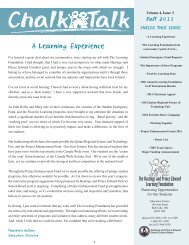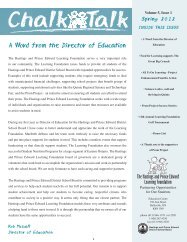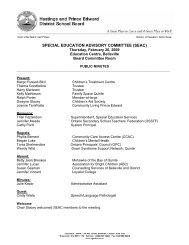Grade 11 Healthy Active Living Education Additional Supports ...
Grade 11 Healthy Active Living Education Additional Supports ...
Grade 11 Healthy Active Living Education Additional Supports ...
Create successful ePaper yourself
Turn your PDF publications into a flip-book with our unique Google optimized e-Paper software.
Using Children • making partner feel guilty about the children<br />
• using the children to relay messages<br />
• using visitation to harass partner<br />
• threatening to take the children away<br />
Using Gender Privilege • treating partner like a servant<br />
• making all the big decisions<br />
• acting like the Òmaster of the castleÓ<br />
• being the one to define the roles<br />
Using Economic Abuse • preventing partner from getting or keeping a job<br />
• making partner ask for money<br />
• giving partner an allowance<br />
• taking his/her money<br />
• not letting partner know about or have access to family<br />
income<br />
Adapted from Domestic Abuse Intervention Project. Physical and Sexual Violence<br />
Power and Control Wheel. Duluth, Minnesota and used by institutions and organizations<br />
that address violent relationships (e.g., Halton WomanÕs Place, Milton, Ontario).<br />
Equality<br />
The following outlines characteristics of a relationship based on equality. The concepts<br />
addressed in this chart are key to understanding what happens in healthy relationships,<br />
thereby providing students with the insight on what to work towards.<br />
Non Violent Relationships Based on Equality<br />
Negotiation and Fairness • seeking mutually satisfying resolutions to conflict<br />
• accepting change<br />
• being willing to compromise<br />
Non-Threatening<br />
• talking and acting so that partner feels safe and comfortable<br />
Behaviour<br />
expressing him/herself and doing things<br />
Respect • listening to partner non-judgmentally<br />
• being emotionally affirming and understanding<br />
• valuing opinions<br />
Trust and Support • supporting partnerÕs goals in life<br />
• respecting partner right to his/her feelings, friends, activities<br />
Honesty and<br />
Accountability<br />
and opinions<br />
• accepting responsibility for self<br />
• acknowledging past use of violence<br />
• admitting being wrong<br />
• communicating openly and truthfully<br />
Responsible Parenting • sharing parental responsibilities<br />
• being a positive non-violent role model for the children<br />
Shared Responsibility • mutually agreeing on a fair distribution of work<br />
• making family decisions together<br />
Economic Partnership • making money decisions together<br />
• making sure both partners benefit from financial<br />
arrangements<br />
<strong>Grade</strong> <strong>11</strong> <strong>Healthy</strong> <strong>Active</strong> <strong>Living</strong> <strong>Education</strong> (PPL30), Module #3 Violence and Risk Taking Behaviour<br />
Page 33
















